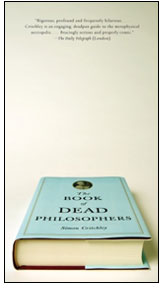Books |
The Book of Dead Philosophers
Simon Critchley
By
Published: Feb 23, 2009
Category:
Philosophy
If only the examined life is worth living, the best job on the planet is to be a philosopher.
But it’s not just life that the philosopher comes to understand, it’s the final exam question — death. Develop a way of looking at death that you can maintain to your last breath, and you’re well on the way to ending your fear of eternity. Or, as Cicero put it, “To philosophize is to learn how to die."
It follows that there’s a lot to be learned from a book that tells us — briefly and colorfully, and with some summary of the thinker’s work — how 190 philosophers have died. Did he/she maintain his/her beliefs to the end? Was there a midnight revelation? Did the philosopher, as the wisest among us, have the skill to look across the valley of death and see what, if anything, waits on the other side?
Philosophy is — at least — the first cousin of logic, so “The Book of Dead Philosophers” can’t be faulted for asking a basic question: How did the great philosophers die?
In their beds, with secretaries recording their final thoughts?
Rarely happened.
But as Simon Critchley, philosophy chairman at the New School for Social Research in New York, explains, that doesn’t invalidate his book — if anything, it’s more interesting to learn how thinkers reacted when they were surprised by death. [To buy the paperback from Amazon, click here. For the Kindle edition, click here.]
Fine. When it comes to The Greats, I believe the telling anecdote is worth a great deal more than an impenetrable dictum.
Try these:
Heraclitus believed everything was in a state of flux — he drowned in cow dung.
Francis Bacon, the king of empiricism, went outside to stuff a chicken with snow — he wanted to observe the effects of refrigeration — and caught pneumonia.
Hobbes said, “Life is solitary, poor, nasty, brutish, and short” — and died in bed, at 91.
Ludwig Wittgenstein, who’d die the day after his birthday, received an electric blanket as a present. "Many happy returns," his friend said. "There will be no returns," Wittgenstein replied.
Thales, said to be the first philosopher, argued that there was no difference between life and death. “Then why not die?” he was asked. He shot back, “Because there is no difference.”
Plato may have died of lice.
Roland Barthes was hit by a dry-cleaning van.
Strato was so thin it was said “he felt nothing” when he died.
Voltaire attacked the Roman Catholic Church for decades — but on his deathbed decided that he wanted to die a Catholic. "Do you believe in the divinity of Christ?" asked the priest. Voltaire: "In the name of God, Monsieur, don’t speak to me any more of that man and let me die in peace."
And Critchley? He feels we worry too much about death and so we dread it more than we should. Reading about the deaths of philosophers, he suggests, is one way to calm ourselves. With Epicurus, he says, “Don’t fear God, don’t worry about death.”
Sounds great. But I suspect more of us might agree with Seneca — he recommended wine as a way to calm yourself before dying.


